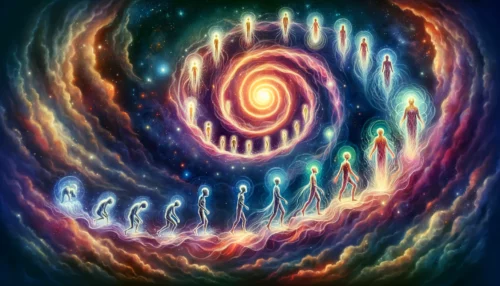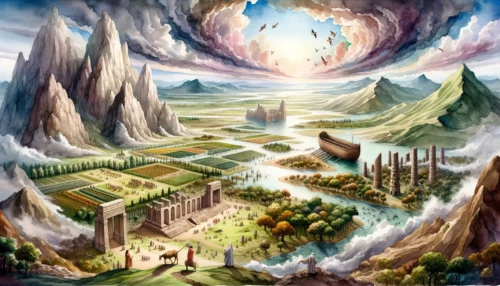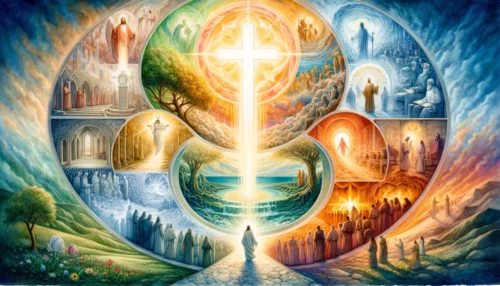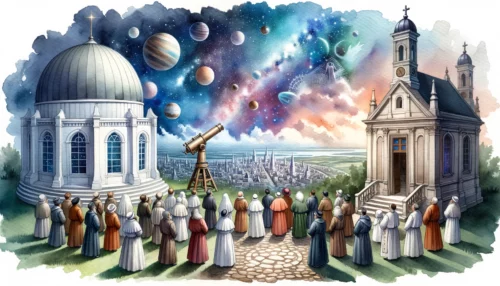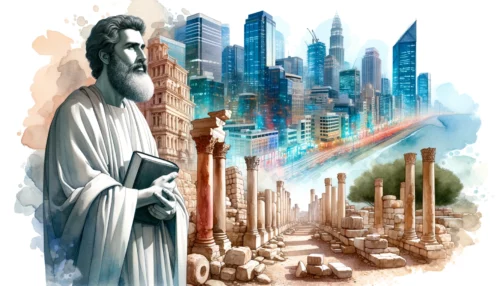Through the ages, humanity has grappled with questions about the nature and origin of God. Among these, the inquiry, “If God created the Universe, who created God?” stands out as a point of ponder for both believers and skeptics alike. From a biblical perspective, these questions open doors to deeper conversations about the nature of God, the concept of eternity, and the fundamental tenets of Christian faith. They invite us to contemplate the nature of a being that transcends our human understanding of time, causality, and existence. This article is an attempt to explore this profound question and extend a biblically grounded understanding that resonates with our faith and spiritual inquiry.
God and the Concept of Eternity
Christian theology regards God as eternal, meaning He exists outside of time, without a beginning or an end. This understanding of God challenges our human perception, which is bound by time, a linear progression from past to future. God’s eternity is a concept expressed throughout biblical teachings, offering us a vision of God as an everlasting, timeless entity (Psalm 90:2).
Exploring the notion of God’s eternity helps us comprehend the question of God’s creation or origin. If God is eternal, the question “Who created God?” becomes an unformed query, a question arising from our human limitations and our inherent understanding of time and causality.
Consider our existence within the constraints of time. We experience life as a series of events: birth, growth, and eventually, death. Everything around us seems to have a beginning and an end. When we apply this linear understanding of time to God, we instinctively ask: “If everything has a beginning, doesn’t God need one too?”
The Christian concept of God, however, is different from this temporal framework. God does not fit into our human-defined temporal restrictions, as He is not subject to time; He is beyond time. God’s existence is not limited by a starting point or an endpoint. He simply is. This eternal nature of God is conveyed in the book of Revelation where God is described as the one “who is, and who was, and who is to come” (Revelation 1:8).
Yet, we find it challenging to comprehend a being that has always existed and will always exist. It’s a concept that feels inherently foreign because it differs drastically from our human experience. In our attempt to understand God, we must remember that our comprehension is inherently limited and bound by our human condition.
God’s eternal nature provides a biblically grounded response to the question “Who created God?” God is understood as an eternal being, existing beyond the confines of time and space, unbounded by beginnings and ends. This divine eternity, whilst challenging to our human understanding, offers a perspective that transcends the linear progression of time. It gives us insight into a God who simply is, without the need for creation or causality. Despite the profound challenges this presents to our comprehension, it remains a fundamental aspect of the Christian understanding of God.
Understanding God as the Uncaused Cause
When confronted with the question of God’s origin, Christian theology presents God as the “Uncaused Cause” or the “First Cause.” This term is not to be found verbatim in the Scriptures, but it’s a concept developed by theologians to express the understanding of God’s eternal existence as derived from the biblical text. It fundamentally refers to the belief that God is the origin of all things, yet Himself has no origin (John 1:1-3).
A cause, as we understand it in our human experience, is an event or entity that gives rise to another event or entity. The concept of cause and effect is deeply ingrained in our understanding of the world. We naturally search for a cause for everything we encounter.
Applying this reasoning to God, we might ask: “What caused God?” But this query seems to stumble upon its own limitations. If God had a cause, then that cause would essentially be God. The question then, would not be “Who created God?” but rather, “What created that which created God?” This line of questioning could continue indefinitely, resulting in an infinite regress which, logically, does not provide a satisfying answer.
Christian theology offers a solution to this philosophical predicament by presenting God as the Uncaused Cause. This concept suggests that God is the ultimate source of all things, the origin of everything, but without an origin Himself. God, as the Uncaused Cause, is the one who sets everything else into motion but is not Himself set into motion by anything else. He is the beginning without a beginning, the cause that itself requires no cause (Romans 11:36).
The concept of the Uncaused Cause serves to illustrate the nature of God’s existence as self-sufficient, uncaused, and eternal. This understanding aligns with the claim that God is independent of all things, while all things are dependent on Him. His existence is not contingent on anything else.
Christian theology posits God as the Uncaused Cause, the ultimate source of all existence without an origin Himself. This concept aligns with the understanding of God as eternal and self-sufficient, not subject to the confines of cause and effect that govern our human comprehension. The belief that God is the origin of all things yet Himself has no origin, provides an insightful response to the question, “Who created God?” It frames God as the beginning without a beginning, the cause that itself requires no cause. As we grapple with these profound notions, we are drawn to admire the immense distinction between God’s divine existence and our human one.
The Transcendence of God: Beyond Time and Space
A crucial aspect of Christian understanding of God’s nature is His transcendence. Transcendence, in this context, refers to God’s existence beyond the physical universe and its laws, including those of time and space. In a sense, God isn’t confined to the physical dimensions of the universe as we know it (Jeremiah 23:23-24).
This idea of transcendence can feel counterintuitive, especially given our human tendency to locate everything within the boundaries of space and time. From the perspective of physics, every object, every event, every living thing, has a location in space and a position in time. Yet, God, in His divine nature, is not bound by such physical constraints.
One way to imagine this is to consider the relationship between an author and a book. The author, in this case, represents God, and the book represents the universe. The author writes the book, creates the characters, and orchestrates the events within the book. Yet, the author exists outside of the book’s world and is not confined by the events or the timeline within it. Similarly, God creates and interacts with the universe but is not confined within its physical boundaries.
Being not bound by time and space, God encompasses all moments, all locations, and all existences simultaneously. He is not waiting for the future nor is He confined to the past; He simply exists in an eternal now, a concept depicted in the description of God as “I AM” in Exodus 3:14.
When contemplating God’s origin, the idea of God’s transcendence implies that He exists beyond such temporal and spatial categories. God doesn’t come “from” somewhere because He exists beyond space. God wasn’t “created” at a certain time because He exists beyond time.
The transcendence of God, His existence beyond time and space, plays a significant role in understanding the question “Who created God?” As per Christian theology, God isn’t bound by the laws and dimensions of the physical universe, much like an author isn’t confined within the world of a book they’ve written. He exists beyond the categories of space and time, which suggests He doesn’t come “from” somewhere nor was He “created” at a specific time. This divine transcendence stands as a crucial characteristic of God’s nature, affirming His distinction from the created universe and reinforcing His uncreated, eternal existence.
Embracing the Mystery of Divine Eternity
As we venture through the landscape of these profound theological concepts – God’s eternity, His nature as the Uncaused Cause, and His transcendence – we encounter a deeper understanding of the nature of God. The question, “Who created God?” invites us into a journey to explore the Divine, a journey that stretches the horizons of our human comprehension and understanding.
In the light of our Christian faith, God is seen as eternal, uncaused, and transcendent. He exists beyond time and space, without a beginning or an end, the source of all existence yet having no source Himself. It’s not a concept that fits neatly into our human understanding, but then, God isn’t human. He’s God.
While these concepts might seem daunting, they don’t distance us from God. Instead, they serve to remind us of His magnificence and the great mystery that surrounds His divine existence. We are reminded of how much bigger God is compared to our human understanding, how much more profound and complex His existence is compared to ours.
As you reflect on this journey, here are some questions to ponder:
- How does the concept of God’s eternity shape your understanding of His divine nature?
- How does understanding God as the Uncaused Cause impact your perspective on the origin of the universe?
- How does the concept of God’s transcendence influence your relationship with Him?
In the grandeur and mystery of God’s nature, we find not a puzzle to be solved, but a marvel to be appreciated. As Christians, we are invited to embrace these mysteries, not as obstacles to faith, but as doorways into a deeper reverence and awe of God’s greatness. Our faith is strengthened, not weakened, by acknowledging that God is beyond our full understanding. After all, a God we could fully comprehend would be a small God indeed. Let us continue to marvel at the mysteries of our faith, reminding ourselves that our God is bigger than our understanding. And in that mystery, we find not fear, but awe-inspired worship.







